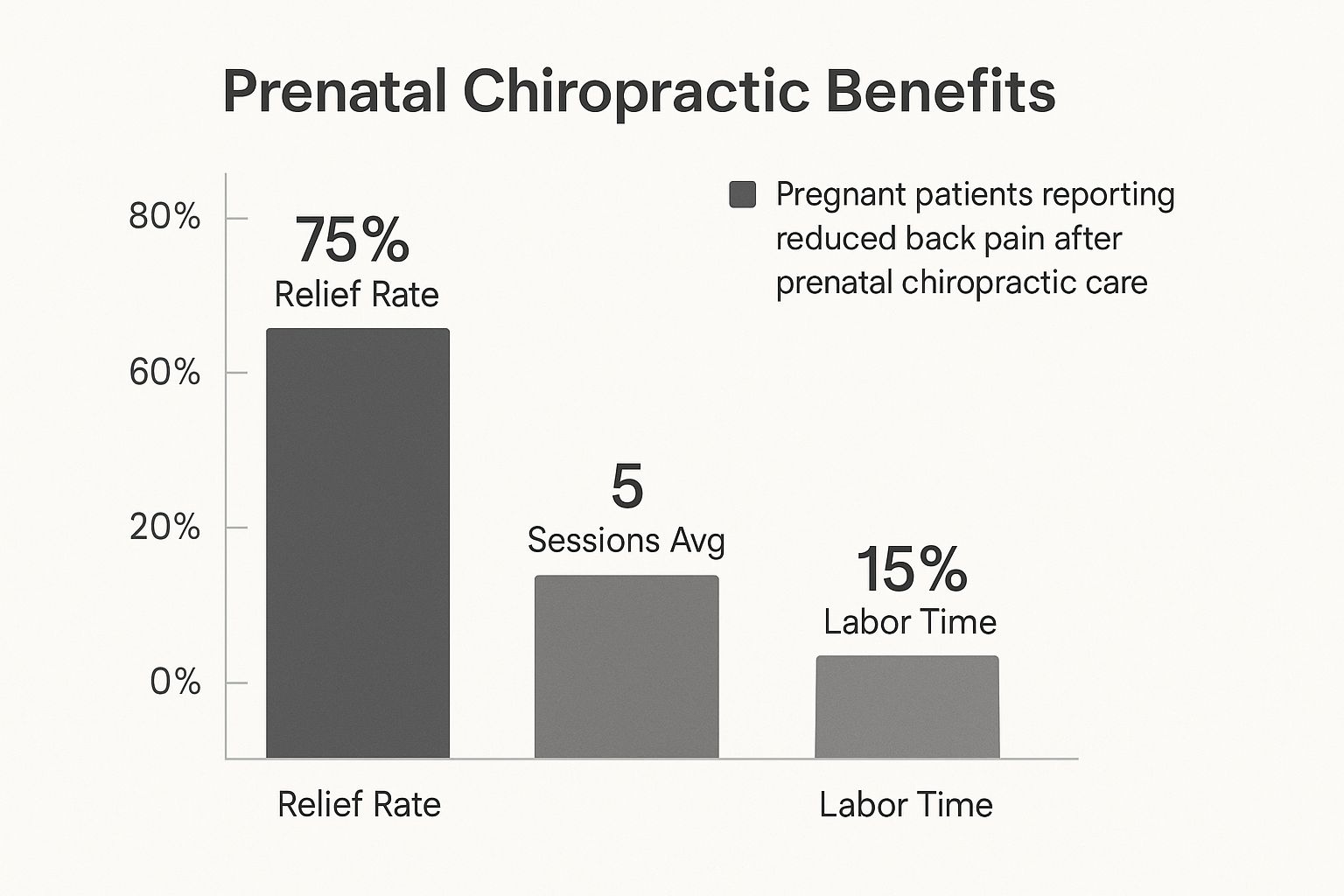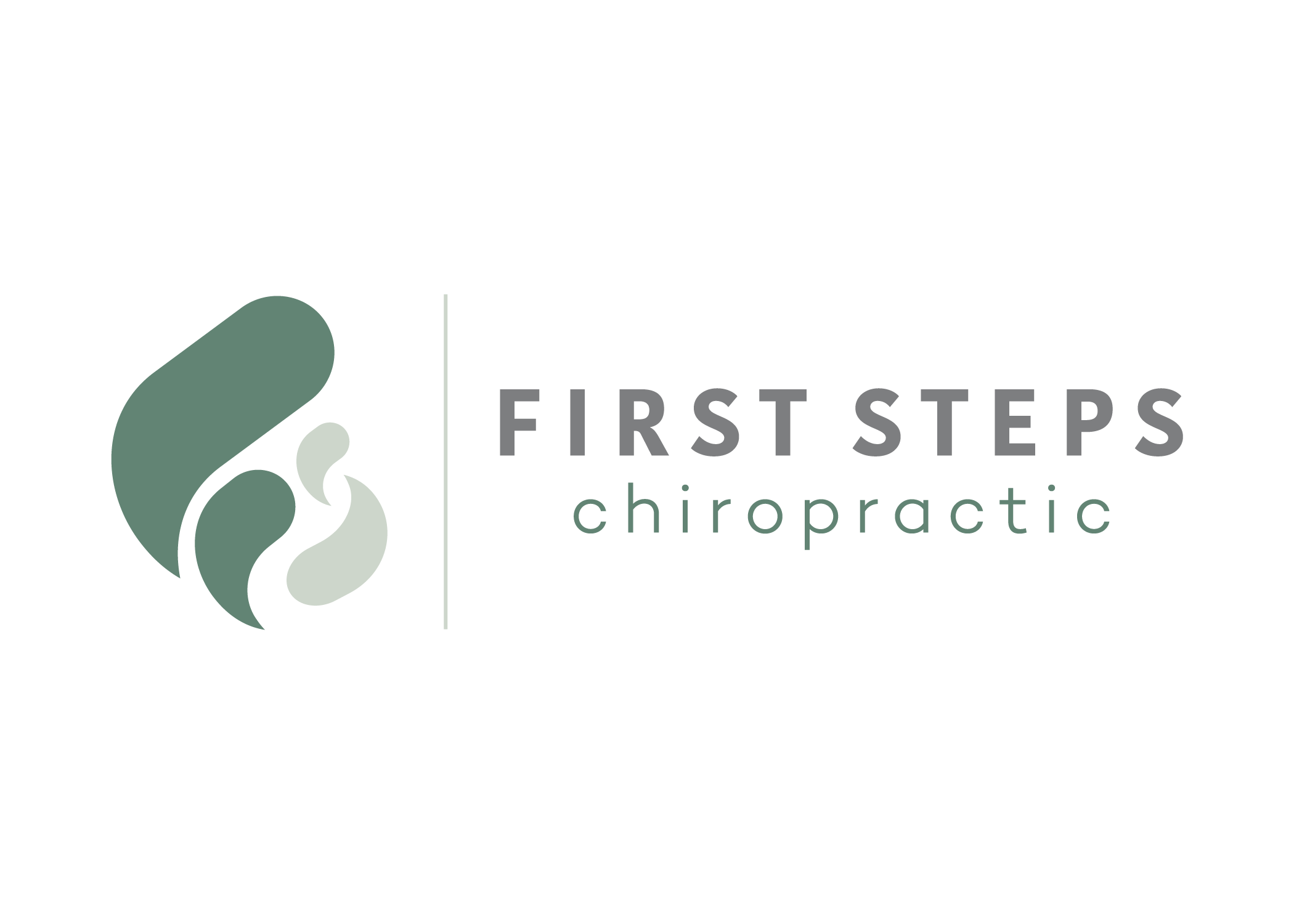When you start searching for "prenatal chiropractic near me," you're taking a powerful first step toward a more comfortable, empowered pregnancy. This specialized care is a completely non-invasive, drug-free approach to managing the incredible physical demands of carrying a child, boosting wellness for both you and your baby.
Why Specialized Care Is So Important for Expectant Mothers
Pregnancy is an amazing journey, but let's be honest—it brings some serious physical changes. As your body makes room for your growing baby, your center of gravity shifts forward, which naturally increases the curve in your lower back. This is a normal part of the process, but it often leads to a whole cascade of discomfort, strain, and pelvic misalignment.
This is where prenatal chiropractic care comes in. It's not about the forceful "cracking" you might see on social media. Instead, it involves gentle, highly specific adjustments designed to restore balance to your pelvis and spine. This specialized approach helps ensure your nervous system is functioning at its best, which is absolutely crucial for your well-being and your baby's healthy development.
Getting to the Root Cause of Pregnancy Pains
So many of those classic pregnancy aches and pains—from low back pain to sciatica—are directly linked to these shifts in your spine and pelvis. By addressing the structural source of the problem, a qualified prenatal chiropractor can help relieve a whole range of issues.
Think of it like this: your pelvis is the foundational home for your uterus. If that foundation is twisted, unbalanced, or "stuck," it can create tension in the surrounding ligaments and muscles, ultimately restricting the space available for your baby to move and grow.
A balanced pelvis doesn't just help you feel more comfortable. It also creates the ideal environment for your baby to get into the best possible position for birth. For many expecting moms, this is one of the biggest reasons they seek out this kind of support.
The Proven Benefits of Prenatal Adjustments
The positive impact of this care isn't just anecdotal; it's widely recognized. In fact, research shows that between 75% and 84% of pregnant women who receive chiropractic therapy report significant relief from back pain. This relief isn't just about feeling good—it allows you to enjoy your pregnancy more fully and stay active.
And the benefits go well beyond just managing pain. Proper pelvic and spinal alignment can also contribute to:
- Reduced feelings of nausea
- Better, more restorative sleep
- Less pressure on the sciatic nerve
- Potentially shorter and smoother labor times
Ultimately, finding the right "prenatal chiropractic near me" is about so much more than getting temporary relief. It’s an investment in a healthier, more empowered pregnancy experience from start to finish. If you want to dive deeper into the specifics, you can learn more about how chiropractic care during pregnancy supports your body through each trimester.
How to Start Your Search for a Local Chiropractor

When you’re pregnant and decide you need a chiropractor, your first instinct is probably to just Google it. While that's a start, finding the right prenatal chiropractor requires a bit more intention.
You're not just looking for any chiropractor—you're looking for a specialist. This means finding a practitioner who truly understands the biomechanics of a pregnant body and has dedicated their practice to perinatal care. The best way to find them? Start with the experts you already have on your side.
Start with Your Trusted Birth Team
Before you even open your laptop, turn to your inner circle of trusted professionals. Your OB/GYN, midwife, or doula likely has a list of chiropractors they know and trust. They see the results of great chiropractic care up close and can guide you to practitioners who are well-respected in the local birth community.
Don't be shy—ask them directly, "Who are the prenatal chiropractors you've worked with and seen great results from?" Their recommendations are pure gold because they're already vetted by people who understand your needs.
A referral from your birth team is powerful. It means a provider has a proven track record of working effectively within a collaborative care model, which is exactly what you want during your pregnancy journey.
This inside track gives you a list of candidates who are not only skilled but also value teamwork and clear communication with your other healthcare providers.
Use Specialized Directories for Vetted Professionals
Once you have a few names from your birth team, it's time to expand your search using specialized databases. These aren't just random business listings; they are curated directories from organizations dedicated to perinatal and pediatric chiropractic.
The go-to resource here is the International Chiropractic Pediatric Association (ICPA). Their directory is an incredible tool for finding chiropractors who have completed advanced training specific to pregnancy and pediatrics.
- ICPA Find a Doctor Tool: This is the gold standard. It lets you find chiropractors who have gone above and beyond with perinatal and pediatric training.
- Webster Technique Certification: You can even filter specifically for practitioners certified in the Webster Technique. This is a huge green flag that they specialize in pregnancy care.
Using these resources confirms you’re looking at chiropractors who’ve invested heavily in their education, far beyond the standard Doctor of Chiropractic (DC) degree. This kind of specialization is becoming more sought-after as people recognize its benefits. In fact, the global chiropractic care market is now valued at around $19.6 billion, with its growth fueled partly by its increasing use during pregnancy. You can read more about the expanding chiropractic market trends.
By building your list from these trusted sources first, you skip the guesswork and start with a solid pool of highly qualified candidates.
Decoding Essential Prenatal Certifications
Once you've put together a shortlist of potential chiropractors, it's time to dig a little deeper into their qualifications. While every chiropractor has a Doctor of Chiropractic (DC) degree, that's just the starting point. For pregnancy care, you really want someone who has gone the extra mile with advanced, specific training.
Think of it this way: you wouldn't go to a general family doctor for complex heart surgery. The same idea applies here. You're looking for a practitioner who has invested significant time and education into understanding the unique biomechanics and needs of a pregnant body. This ensures they can care for you safely and effectively as your body changes.
Beyond The Basic DC Degree
The first thing to look for is proof of specialized training from respected perinatal organizations. These certifications show a real commitment to pregnancy and pediatric care that goes far beyond what's taught in a general chiropractic program.
Two of the most important credentials to spot are CACCP (Certified by the Academy Council of Chiropractic Pediatrics) or DACCP (Diplomate with the Academy Council of Chiropractic Pediatrics). Both are awarded by the International Chiropractic Pediatric Association (ICPA) and represent hundreds of hours of advanced coursework and hands-on training focused specifically on caring for pregnant women and children.
Seeing CACCP or DACCP after a chiropractor’s name is a huge green flag. It tells you they’ve dedicated a massive part of their career to becoming an expert in this field, making them an excellent choice when you're searching for "prenatal chiropractic near me."
To help you quickly vet potential chiropractors, here's a breakdown of the key credentials and why they matter for your pregnancy journey.
Key Credentials For a Prenatal Chiropractor
Use this quick reference guide to understand the essential qualifications and what they mean for your care.
| Credential/Certification | What It Means | Why It's Important For Pregnancy |
|---|---|---|
| DC (Doctor of Chiropractic) | This is the foundational degree required to practice chiropractic in the United States. | It's the baseline qualification, but it doesn't guarantee specialized knowledge in prenatal care. |
| Webster Technique Certified | The chiropractor has completed specific training in this gentle adjustment for the pelvis. | This technique is crucial for balancing the pelvis, which can help your baby get into the best position for birth. |
| CACCP Certified | The practitioner has completed a 200-hour postgraduate certification program focused on pregnancy and pediatric care through the ICPA. | This indicates extensive, specialized training in safely and effectively caring for pregnant mothers and infants. |
| DACCP Certified | This is a more advanced, 400-hour Diplomate program from the ICPA, representing the highest level of specialty training in the field. | A doctor with this credential is a true specialist with in-depth knowledge of complex perinatal cases. |
Having a quick checklist like this makes it much easier to feel confident you're choosing a provider with the right expertise for you and your baby.

The data speaks for itself. Prenatal chiropractic care can make a real difference, from providing significant pain relief to helping shorten labor times for many mothers.
The Importance Of Webster Technique Certification
Another non-negotiable credential is Webster Technique Certification. This isn't just a general adjustment; it's a specific chiropractic analysis and adjustment designed to restore proper balance to your pelvic muscles and ligaments.
When the pelvis is out of balance, it can create tension in the surrounding ligaments, particularly the round ligament, which supports the uterus. This tension can twist and constrain the uterus, potentially restricting your baby’s movement and making it harder for them to get into an ideal head-down position for birth.
The Webster Technique directly addresses this imbalance. By gently restoring pelvic alignment, it helps create more room for your baby to move freely. This technique is well-known for its success in helping resolve breech presentations, with studies showing a success rate between 84% and 92%.
When you're vetting a chiropractor, ask them directly if they are certified in the Webster Technique. It’s a foundational skill for any practice that specializes in pregnancy care. To learn more about how it works, you can read about the power of the Webster for pregnancy and see how it supports your body’s natural ability to prepare for labor.
Making the Most of Your First Consultation

Alright, you've done your research and have a short list of potential chiropractors. Now comes the most important step: the first consultation. It's best to think of this meeting less like a typical doctor's appointment and more like an interview. You aren't just a patient; you're building your birth team, and you need to find the right expert to join it.
Your goal is twofold. First, you need a provider who is technically skilled. But just as important, you need someone you genuinely feel comfortable with and can trust completely. This relationship is deeply personal. Pay close attention to how they listen, the way they explain concepts, and whether you feel truly seen and heard.
Asking the Right Questions
Going beyond a simple "Do you treat pregnant women?" is essential. You want to ask pointed questions that get to the heart of their expertise and commitment to perinatal care. Think of yourself as a detective, gathering the clues you need to make the best choice for you and your baby.
Here are a few powerful questions to get you started during your consultation:
- What percentage of your practice is focused on perinatal and pediatric care? An answer of 50% or more is a great sign. It shows this is a true specialty, not just something they offer on the side.
- How do you typically work with a patient's OB/GYN, midwife, or doula? You're looking for an answer that shows a history of open communication and a team-based approach to care.
- Can you describe what a typical adjustment looks like for a pregnant patient in their third trimester? This question gives you insight into their specific techniques and confirms they prioritize gentle, safe methods.
- What other support or resources do you offer pregnant patients besides adjustments? This can reveal if they provide helpful extras like specific exercises, nutritional advice, or connections to other local birth resources.
These questions help you see the practical differences in how they operate. For more background, you can also check out our guide on how pregnancy chiropractic is different than traditional care.
What to Observe in the Clinic
Pay attention to more than just their answers. The physical environment and the overall vibe of the office speak volumes. A clinic that truly specializes in prenatal care will have invested in the right equipment to support pregnant bodies.
Look for specialized tables that have drop-away sections to comfortably accommodate a growing belly, making sure no pressure is ever put on your abdomen. You should also spot plenty of pregnancy pillows and supportive cushions, which are crucial for making adjustments both safe and comfortable. Seeing this equipment is a clear signal that they regularly care for expectant mothers.
The feeling you get in the office is just as important as the equipment. Does the space feel welcoming and calming? Is the staff friendly and supportive? Trust your intuition—you should feel relaxed and confident from the moment you walk in.
This level of detail and specialized care is becoming more common. In fact, North America is a leader in the chiropractic field, with an expected 39.4% market share. This is driven by a well-developed infrastructure and the growing recognition of chiropractors as key healthcare providers, which ultimately improves access to quality care for patients like you.
By combining sharp questions with your own observations, you'll feel confident in finding a prenatal chiropractor who is the perfect fit for your pregnancy journey.
Benefits You Can Expect Throughout Each Trimester

Prenatal chiropractic care isn't a one-and-done fix. Think of it more like an ongoing partnership that adapts as your body goes through its incredible pregnancy journey. Each trimester brings its own set of challenges, and a skilled chiropractor will tailor your care plan to match exactly what you need, when you need it.
The main goal is always to improve how your nervous system is functioning and to create balance in your body. But how we achieve that evolves as your pregnancy moves along.
This consistent support helps you navigate the rollercoaster of symptoms that can pop up. For so many of my patients, it becomes an essential part of their wellness routine, offering both physical relief and some much-needed peace of mind.
The First Trimester: Finding Your Footing
Those first twelve weeks can feel like a total whirlwind of hormones. Your body is working overtime, long before you even have a noticeable baby bump. It's a time when many women find that chiropractic care can really help manage those common, and often draining, early symptoms.
Gentle adjustments can help soothe the nervous system. For some women, this brings a sense of calm that can ease nausea and morning sickness. By addressing your spinal alignment right from the start, we're building a solid foundation for all the physical changes coming your way, which can also help with that deep fatigue that often defines this first phase.
The Second Trimester: Accommodating Growth
Once you hit the second trimester, your baby starts growing fast, and your body adapts by shifting your center of gravity. This is usually when the classic aches and pains start to creep in, especially in the low back and hips. It's totally normal.
Your chiropractor will shift focus to maintaining pelvic balance and keeping your spine aligned to help offset that increasing strain. This proactive care can help with common issues like:
- Round ligament pain: Gentle adjustments can take the tension off the ligaments supporting your growing uterus.
- Sciatica: Proper alignment can relieve pressure on the sciatic nerve, which is a frequent source of that sharp, shooting pain down the leg.
- Low back pain: By keeping your lumbar spine mobile and balanced, adjustments can head off the severe discomfort that comes from postural shifts.
The goal here is all about proactive support. We want to address those minor misalignments before they turn into major pain points. This helps you stay active and feel more comfortable as your body continues to change.
The Third Trimester: Preparing for Birth
In the final stretch, the game plan changes. The focus shifts almost entirely to preparing your body for labor and delivery. Our primary goal is to make sure your pelvis is perfectly aligned and balanced, creating the best possible environment for your baby to move into that ideal head-down position.
This is where a special technique called the Webster Technique becomes so important. It’s a specific chiropractic analysis and adjustment protocol designed to reduce sacroiliac joint dysfunction. In simple terms, it helps balance the pelvic muscles and ligaments, which can significantly improve pelvic function and create more room for your baby.
The benefits carry right through to the birthing process. In fact, consistent care is linked to better birth outcomes. One study found that 72% of pregnant women who received chiropractic adjustments reported less discomfort during labor and simpler deliveries. You can find more details on these chiropractic statistics and pregnancy.
This kind of support can be a key factor in feeling more prepared and empowered for the big day. Searching for a "prenatal chiropractic near me" who is certified in these specific techniques can truly make all the difference.
Common Questions About Prenatal Chiropractic Care
Even with all the research in the world, it’s completely normal to have some questions before you jump in. This is a big decision for your health and your baby's, and feeling confident is non-negotiable.
Let's walk through some of the most common questions and concerns we hear from expecting mamas. Getting clear, real-world answers will help you move forward with total peace of mind.
Is Chiropractic Care Safe During Pregnancy?
Yes, absolutely. When you're in the hands of a chiropractor with specialized prenatal training, chiropractic care is incredibly safe and gentle. These practitioners are experts in modifying their techniques for a pregnant body, using low-force adjustments that prioritize your comfort and safety.
A properly equipped clinic will have special tables and pillows that cradle your belly, so there’s never any pressure on your abdomen. It’s a wonderful, drug-free way to support your body’s natural wisdom. As always, it’s a great idea to keep your OB/GYN or midwife in the loop about all the care you’re receiving.
What Is the Webster Technique?
The Webster Technique is a specific chiropractic analysis and adjustment that focuses entirely on the pelvis. The main goal is to reduce sacroiliac joint dysfunction, which in turn helps restore balance to the pelvic muscles and ligaments.
Think of it as creating more room and freedom inside your pelvis. When we ease tension in the uterus and the surrounding ligaments, it helps create the perfect environment for your baby to get into the best possible position for birth. This technique isn't just for breech presentations—it's highly recommended for all pregnant women to promote a healthier, more comfortable pregnancy and birth.
The Webster Technique isn’t about "turning" a baby. It's about restoring proper function to the mother's pelvis, which allows the baby to get into the optimal position on its own. This is a crucial distinction.
This gentle method is a cornerstone of modern prenatal chiropractic, showing a deep respect for working with the body's innate intelligence.
How Often Will I Need to Go?
This really depends on you. There's no one-size-fits-all schedule; the frequency of your visits will be based on your specific needs and health goals.
At the beginning, your chiropractor might suggest coming in weekly or bi-weekly to address your main concerns and get things stable. As your body starts to respond and your symptoms get better, that schedule will likely change. A good practitioner will create a personalized care plan that evolves with you through each trimester, making sure you get exactly the right support at the right time.
Will My Insurance Cover Prenatal Chiropractic Visits?
This is a great, practical question. The short answer is: often, yes. Many insurance plans do provide coverage for chiropractic care, but the details can vary quite a bit from one plan to the next.
Your best bet is to call your insurance provider directly and ask about your specific benefits for chiropractic services. The clinic’s office staff can also be a huge help here. They’re usually more than happy to do a benefits check for you, which will clarify your coverage and any potential out-of-pocket costs. This way, you can budget accordingly without any surprises down the road.
Are you looking for a “prenatal chiropractic near me” who truly understands the needs of expectant mothers? At First Steps Chiropractic, we specialize in gentle, neurologically-focused care for every stage of your pregnancy journey. Schedule your complimentary consultation with us today to learn how we can support you.

